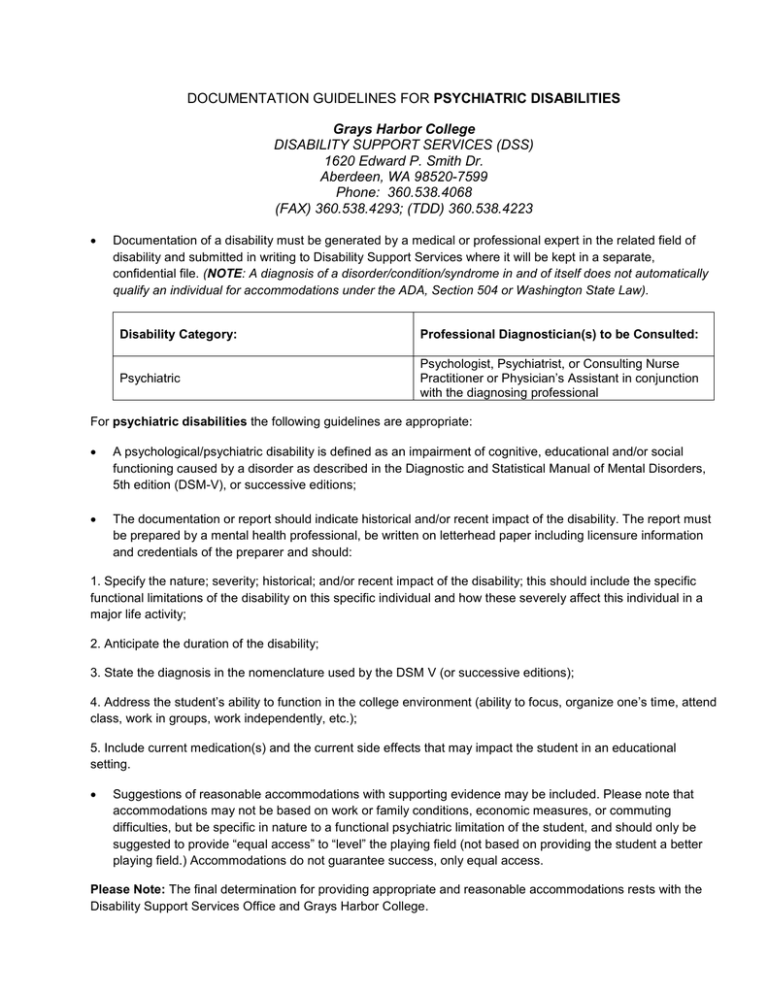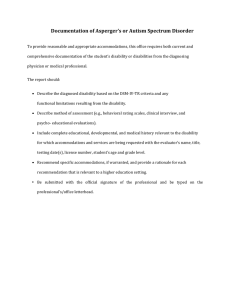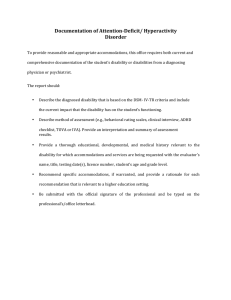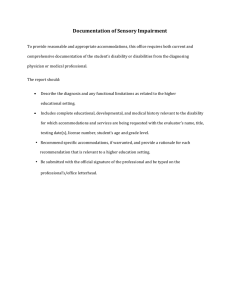PSYCHIATRIC DISABILITIES Grays Harbor College DISABILITY SUPPORT SERVICES (DSS)
advertisement

DOCUMENTATION GUIDELINES FOR PSYCHIATRIC DISABILITIES Grays Harbor College DISABILITY SUPPORT SERVICES (DSS) 1620 Edward P. Smith Dr. Aberdeen, WA 98520-7599 Phone: 360.538.4068 (FAX) 360.538.4293; (TDD) 360.538.4223 Documentation of a disability must be generated by a medical or professional expert in the related field of disability and submitted in writing to Disability Support Services where it will be kept in a separate, confidential file. (NOTE: A diagnosis of a disorder/condition/syndrome in and of itself does not automatically qualify an individual for accommodations under the ADA, Section 504 or Washington State Law). Disability Category: Professional Diagnostician(s) to be Consulted: Psychiatric Psychologist, Psychiatrist, or Consulting Nurse Practitioner or Physician’s Assistant in conjunction with the diagnosing professional For psychiatric disabilities the following guidelines are appropriate: A psychological/psychiatric disability is defined as an impairment of cognitive, educational and/or social functioning caused by a disorder as described in the Diagnostic and Statistical Manual of Mental Disorders, 5th edition (DSM-V), or successive editions; The documentation or report should indicate historical and/or recent impact of the disability. The report must be prepared by a mental health professional, be written on letterhead paper including licensure information and credentials of the preparer and should: 1. Specify the nature; severity; historical; and/or recent impact of the disability; this should include the specific functional limitations of the disability on this specific individual and how these severely affect this individual in a major life activity; 2. Anticipate the duration of the disability; 3. State the diagnosis in the nomenclature used by the DSM V (or successive editions); 4. Address the student’s ability to function in the college environment (ability to focus, organize one’s time, attend class, work in groups, work independently, etc.); 5. Include current medication(s) and the current side effects that may impact the student in an educational setting. Suggestions of reasonable accommodations with supporting evidence may be included. Please note that accommodations may not be based on work or family conditions, economic measures, or commuting difficulties, but be specific in nature to a functional psychiatric limitation of the student, and should only be suggested to provide “equal access” to “level” the playing field (not based on providing the student a better playing field.) Accommodations do not guarantee success, only equal access. Please Note: The final determination for providing appropriate and reasonable accommodations rests with the Disability Support Services Office and Grays Harbor College.







